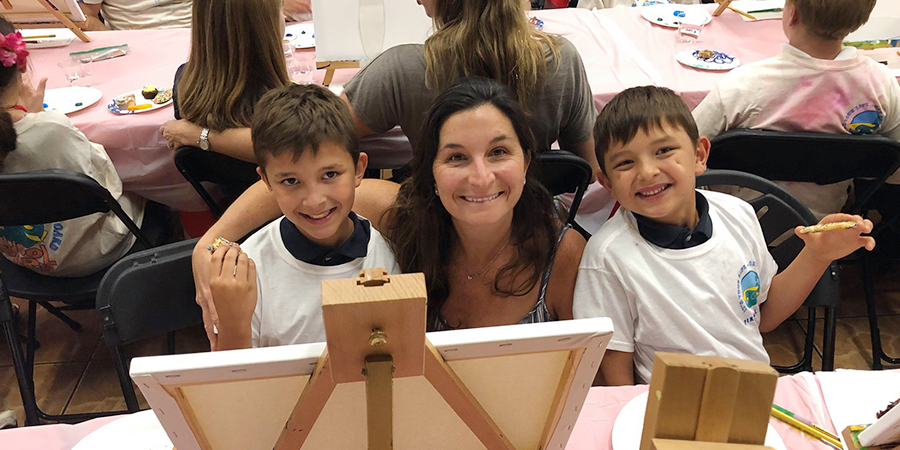Defining Parents’ Roles in Children’s Education
They say education starts in the home, but what does that really mean?
Parents are a child’s first teachers. From walking and talking to exploring nature, reading, cooking and counting, a parent’s role in a child’s education is critical. As that child begins formal schooling, however, your role may begin change. Instead of teaching the ABCs, you’ll be showing your child how his or her schooling will continue the learning that you began together at home. You’ll become the guide who helps your child organize his or her time and supports their desires to learn new things in and out of school. So what can you do to manage your changing role and support your child’s education now and in the future?
Foster a Love for Learning
Our attitudes about education will have a significant impact on our child’s views on school and learning. So start by infusing a love of learning into your home. Display genuine enthusiasm for school and learning. Read to your child and let your child see you reading or taking a course. Take regular trips to museums, libraries and bookstores as part of outings. Watch documentaries as a family. Consider visiting your local IMAX movie theater to watch documentaries on a huge scale. Make a big deal out of the first day of school. Remember to talk positively about teachers and school personnel in front of your children.
Support Your Child’s Interests
If your child displays an interest in a particular topic, support his or her interests by finding a local class or camp where he or she can explore the topic further. Supply him or her with books and materials related to his or her interest. Try to visit a professional in that field.
Annie, for example, is encouraging her son’s desire to be a horologist by buying books on watch repair. On social media, she recently found a couple whose watchmaker father left behind a library and tools they were happy to donate to him. While she would never have considered horology as a career field for him, she is now supporting him as much as she can in his endeavors.
Control Electronics and Other Distractions
As hard as it might be, parents need to take control of electronics. It is easy for children to spend hours watching videos or playing games. While these activities have their merits, children’s spare time should be balanced. Sometimes children watch things of questionable value or communicate inappropriately with others while they are on the internet. Parents need to monitor the time they spend with electronics as well as the content. Some videos, games and websites can actually support learning, so the key is to become involved in what a child is doing with electronic devices.
Homework Help
Parents should support their children with their homework and other assignments. This is not to say that parents should do their children’s homework, which, believe it or not, happens. Rather, parents should help their children establish good homework routines. Children should have a quiet place in which to do their homework. Families should set aside regular times for homework. Parents may need to teach their children to develop a habit of writing homework assignments down in a planner or assignment pad. A special project may require special materials or help with instructions. Finally, if parents monitor their child’s homework they may be able to provide feedback and help their child understand the material better.
Teach Your Child to Monitor Grades
Parents should monitor their child’s grades online together with their children. Teaching their child to keep abreast of their grades will give the parent and child opportunities to discuss what is going on at school. It will teach children that their grades are important. It will also show them that they need to monitor their progress in school just like they would monitor their health or their bank accounts. By the time children reach the upper grades of high school, monitoring their grades has become second nature. Children should be encouraged to speak up if they feel they have received a grade in error or if they need an opportunity to improve grades.
Make School a Priority
We all have busy lives and sometimes we can let school take second stage to family gatherings or sports practices. Parents have to choose to make school the number one priority. This starts with attendance. Students need to know that parents take attendance seriously.
If parents take students out regularly for trips to an amusement park, for example, the children will get the idea that school isn’t all that important. Likewise, if after school activities begin to affect a child’s schoolwork, a parent may have to make the very tough decision to cut back until a child can handle both.
Mary Ann is concerned that her 13-year-old son, Robert, will not be able to handle the demands of the wrestling team and schoolwork. They’ve made a pact this school year to monitor his grades closely. If his grades take a dip, Rob knows ahead of time that he will have to step down and try again next year.
Get Involved
Studies show that students who do well in school often have parents who are involved. Stay in communication with your child’s teachers. If there are issues in the classroom, ask his or her teacher to keep you abreast of them. Also ask them to keep you informed of special interests and positive news as well. Teachers are there to support your child; they want you to be involved.
Schools also need parents to help out in many other ways, from volunteering during the day, to manning concessions at a game to chaperoning field trips and fundraisers. Show your child how important school is by donating your time to these activities.
Getting involved this way is also an excellent way to meet other parents, who can provide a network for years to come. Parents can help each other with transportation needs or by providing guidance or a frame of reference. Parents who are involved will feel more comfortable asking for assistance or for special considerations from the school. It takes a village to raise a child, and your village starts with the school.
IDEAL School Welcomes Families
The IDEAL school was started by one family who wanted to ensure that their children had an extraordinary learning experience that focused on their emotional and cognitive growth. Teachers at IDEAL welcome parental involvement because we believe that working together will provide a seamless and happy educational experience for your children. Contact us today to learn more about the IDEAL School of Advanced Learning in Royal Palm Beach.


